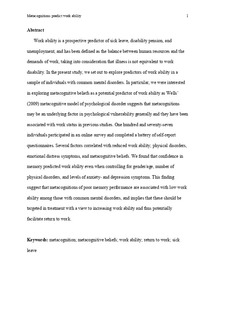Predictors of Work Ability in Individuals With a Common Mental Disorder: Is There an Effect of Metacognitive Beliefs Among Poor Physical Health and Emotional Distress?
| dc.contributor.author | Nordahl, Henrik | |
| dc.contributor.author | Wells, Adrian | |
| dc.date.accessioned | 2019-11-18T08:52:19Z | |
| dc.date.available | 2019-11-18T08:52:19Z | |
| dc.date.created | 2019-10-15T08:30:05Z | |
| dc.date.issued | 2019 | |
| dc.identifier.issn | 0813-4839 | |
| dc.identifier.uri | http://hdl.handle.net/11250/2628884 | |
| dc.description.abstract | Work ability is a prospective predictor of sick leave, disability pension and unemployment, and has been defined as the balance between human resources and the demands of work, taking into consideration that illness is not equivalent to work disability. In the present study we set out to explore predictors of work ability in a sample of individuals with common mental disorders. In particular, we were interested in exploring metacognitive beliefs as a potential predictor of work ability, as Wells’ (2009) metacognitive model of psychological disorder suggests that metacognitions may be an underlying factor in psychological vulnerability generally, and they have been associated with work status in previous studies. One hundred and seventy-seven individuals participated in an online survey and completed a battery of self-report questionnaires. Several factors correlated with reduced work ability: physical disorders, emotional distress symptoms and metacognitive beliefs. We found that confidence in memory predicted work ability even when controlling for gender/age, number of physical disorders, and levels of anxiety and depression symptoms. This finding suggest that metacognitions of poor memory performance are associated with low work ability among those with common mental disorders, and implies that these should be targeted in treatment with a view to increasing work ability and thus potentially facilitate return to work. | nb_NO |
| dc.language.iso | eng | nb_NO |
| dc.publisher | Cambridge University Press | nb_NO |
| dc.title | Predictors of Work Ability in Individuals With a Common Mental Disorder: Is There an Effect of Metacognitive Beliefs Among Poor Physical Health and Emotional Distress? | nb_NO |
| dc.type | Journal article | nb_NO |
| dc.type | Peer reviewed | nb_NO |
| dc.description.version | acceptedVersion | nb_NO |
| dc.source.journal | Behaviour change | nb_NO |
| dc.identifier.doi | 10.1017/bec.2019.15 | |
| dc.identifier.cristin | 1737044 | |
| dc.description.localcode | © 2019. This is the authors’ accepted and refereed manuscript to the article. Locked until 14.4.2020 due to copyright restrictions. | nb_NO |
| cristin.unitcode | 1920,0,0,0 | |
| cristin.unitcode | 194,67,40,0 | |
| cristin.unitname | St. Olavs Hospital HF | |
| cristin.unitname | Institutt for psykologi | |
| cristin.ispublished | true | |
| cristin.fulltext | postprint | |
| cristin.qualitycode | 1 |
Files in this item
This item appears in the following Collection(s)
-
Institutt for psykologi [3078]
-
Publikasjoner fra CRIStin - NTNU [37994]
-
Publikasjoner fra Cristin - St. Olavs hospital [1522]
-
St. Olavs hospital [2498]
